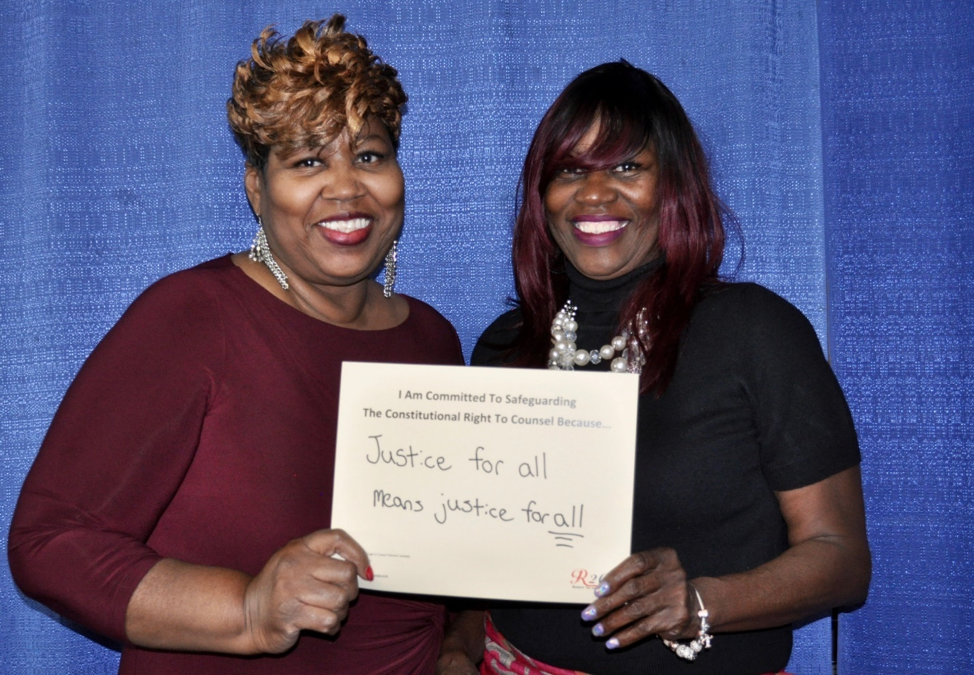Messaging for the Public

From left, Thelma Michell and Janice Sewell, conference attendees
Key Messages
The quality of justice a person receives should not be determined by how much money a person has.
Providing competent legal representation is necessary to prevent innocent people from going to jail.
Fairness requires that all accused persons have access to a competent legal attorney to represent them.
Guaranteeing that every person accused of a crime has the right to a lawyer is a fundamental American right that is written into our Constitution.
A better public defense system will lead to fewer young people having their lives ruined because they are convicted of minor offenses.
A robust majority is aware of the right to counsel, so advocates do not need to spend much energy to convince Americans that this right is important to America’s sense of justice and fair play. The messages the public responds most to are those that emphasize core values that underlie support for this right. Below is a 30-second message for the public:
Today, the Constitutional right to an attorney for those accused of crimes is being denied across our country, where public defender caseloads are so high and their resources so low that the justice system is unfair, innocent people are going to jail, and young lives are being derailed by convictions for minor offenses. We need to insist on national standards to ensure that public defenders and court-appointed attorneys have the time and resources necessary to do their jobs.
Audiences
A communications strategy should turn the strong support that public defense now enjoys among African Americans into action, and then to nurture support among the next two most sympathetic groups—Latinos and young adults of all backgrounds.
African Americans are the most supportive group of the right to counsel when tested at the beginning and the end of the interview. They are the most likely to increase their support after hearing both sides. African Americans come to this issue with a more acute awareness of the need, a more critical view of public defenders and the public defense system, and a greater willingness to spend resources on improvements. They can be a very effective catalyst for change.
Latinos are the next most supportive at the beginning of the interview and their support does not wane when retested late in the interview. They are also highly supportive of a federal requirement to enforce improvements of public defense in the states.
Among young people ages 18-29, support increased between early and late in the interview after they had heard messages pro and con for spending resources to improve public defense.
There are some differences by audience, which point to some small tweaks in message strategies for African Americans, Latinos, young people, and whites. See below.
African Americans: The core messages speak loudly to African Americans. Because they already are aware of the inadequacies of the system, it would be most helpful to focus communications to them more on core values and less on providing information about the system's shortcomings.
Latinos: Communications to Latinos should also stress core values. They are particularly interested in public defense as a way to save young lives from being ruined by convictions for minor offenses.
18- to 29-year-olds and whites: Young adults also resonate to the core values message, but they need to hear about shortcomings in the current system. These informational messages are also generally more important for whites than for people of color to hear.
Messaging Dos and Don'ts
| Do | Do Not |
|---|---|
| Do lead communications with the values of fairness, innocence, and saving young lives. | Do not lead with more complex, educational messages that require the public to see broader, system-reform outcomes from an improved public defense, such as reducing over-incarceration, fighting racial injustice in the criminal justice system, and reducing prison costs. |
| Do reference that the right to counsel is stated in the Constitution. | Do not assume everybody knows it is a constitutional right. |
| Do describe the needed improvements as overcoming shortcomings of the PD system, such as huge caseloads and lack of resources. | Do not describe the needed improvements as better training or higher quality, individual public defenders. |
| When possible, do describe the need in more inclusive terms – to provide public defenders for all people who need them. | When possible, avoid describing the need specifically for one class of people – low-income people who are accused of crimes. |
| Do assert the need for national standards for a minimum level of resources that should be available to all public defenders. | Do not talk about needing federal standards or federal government imposed standards for PDs. |
| When describing the unfairness of the system, describe the months that people wait in jail for an attorney to represent them, or the short time PDs have to represent each client because of high caseloads. | Do not try to convey urgency or unfairness by citing low wages for PDs. |
| Do try to recruit local law enforcement as messengers for the cause of improved public defense. | Do not make local police the enemy of adequate public defense. |
| Do use specific cases of real people who have suffered because of inadequate public defense. | Do not rely on statistics alone to tell your story. |